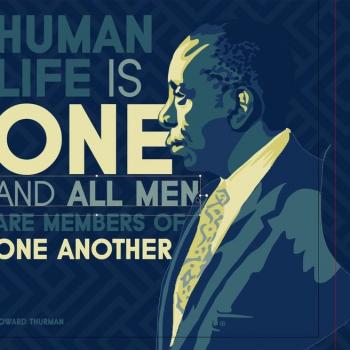The problem, theologically and otherwise, is that in Drive, as in many of our popular culture artifacts, our new Jesus kills people. The movie's violence, surprising and brutal, comes after the Driver has befriended a mother and her son (Carey Mulligan and Kaden Leos) who live in his building. Although he has romantic feelings for the mother—and she for him—their lives are upended when her semi-estranged husband (Oscar Isaac) returns from prison and bad guys want him to do one last job for them, threatening the boy and his mom if he doesn't comply.
The Driver won't stand for that. And although he has been quiet and shy and completely in control, he stomps a man to death in the elevator in a scene—one of several in this film—that I simply could not watch.
This is exactly the sort of thing that biblical scholar and theologian Walter Wink refers to as the Myth of Redemptive Violence, another of our American monomyths—if not, as Wink argues, our central global myth. In pop culture, our Christ figures—whether they are Neo in The Matrix or The Preacher in Clint Eastwood's Pale Rider—employ violence to save innocents, and that understanding informs what we do as a nation. Executing criminals, torturing terrorists, bombing opposing nations—we are believers that violence can solve problems, perhaps because, at least in the short run, it does.
We expect that if The Driver successfully employs violence against all these foes, the mom and little boy will be safe.
But as the tagline suggests, this employment of violence has its costs.
I argue in my recently-completed book on post-9/11 religion and culture that the TV show 24, extolled by many for its depiction of redemptive violence, also shows the soul costs to super-agent Jack Bauer (Kiefer Sutherland), and those soul costs are graphically represented in this film by the staining of The Driver's immaculate white satin jacket.
They are also shown dramatically: although he has sacrificed everything for her and for her son, The Driver does not get them as a plot prize. Like classic Western heroes from Shane on, the movie recognizes that violence disqualifies someone from returning to polite society.
In simple terms, could a woman ever love a man she has watched stomp another man until his skull burst open?
If there is a positive Jesus-y message from the film, it clearly cannot be about the efficacy of violence. As Martin Luther King preached in Strength to Love, "Hate multiplies hate, violence multiplies violence, and toughness multiplies toughness in a descending spiral of destruction." A stage littered with bodies is always the sign that we are watching a tragedy.
But one of the most positive things I carried away from Drive was The Driver's willingness to sacrifice the things that he wanted for a greater good. As the electronica band College reminds us on the film's soundtrack, when The Driver steps away from his narrow concerns and begins to live for others, he becomes a real hero—and a real human being. It's a violent but nonetheless true path of love, and (if you could somehow subtract the stomping) could represent Jesus' admonitions in the Gospel of John to love without regard to one's own welfare, to love so much that you're willing to give up your life for another—as indeed The Driver is willing to do.
When we look at pop culture for spiritual and philosophical meanings, we have to be clear-eyed; we have to note the negatives and positives, for culture can influence us by appealing to our darker as well as our most enlightened sensibilities. But even with its violence, a movie like Drive—beautifully made and entrancing—can remind us of the cost of that violence, and inspire us to give our lives in love.





